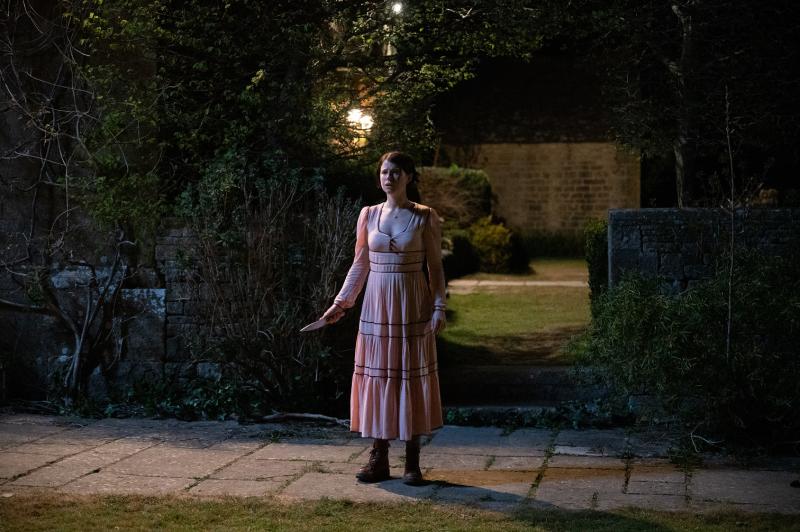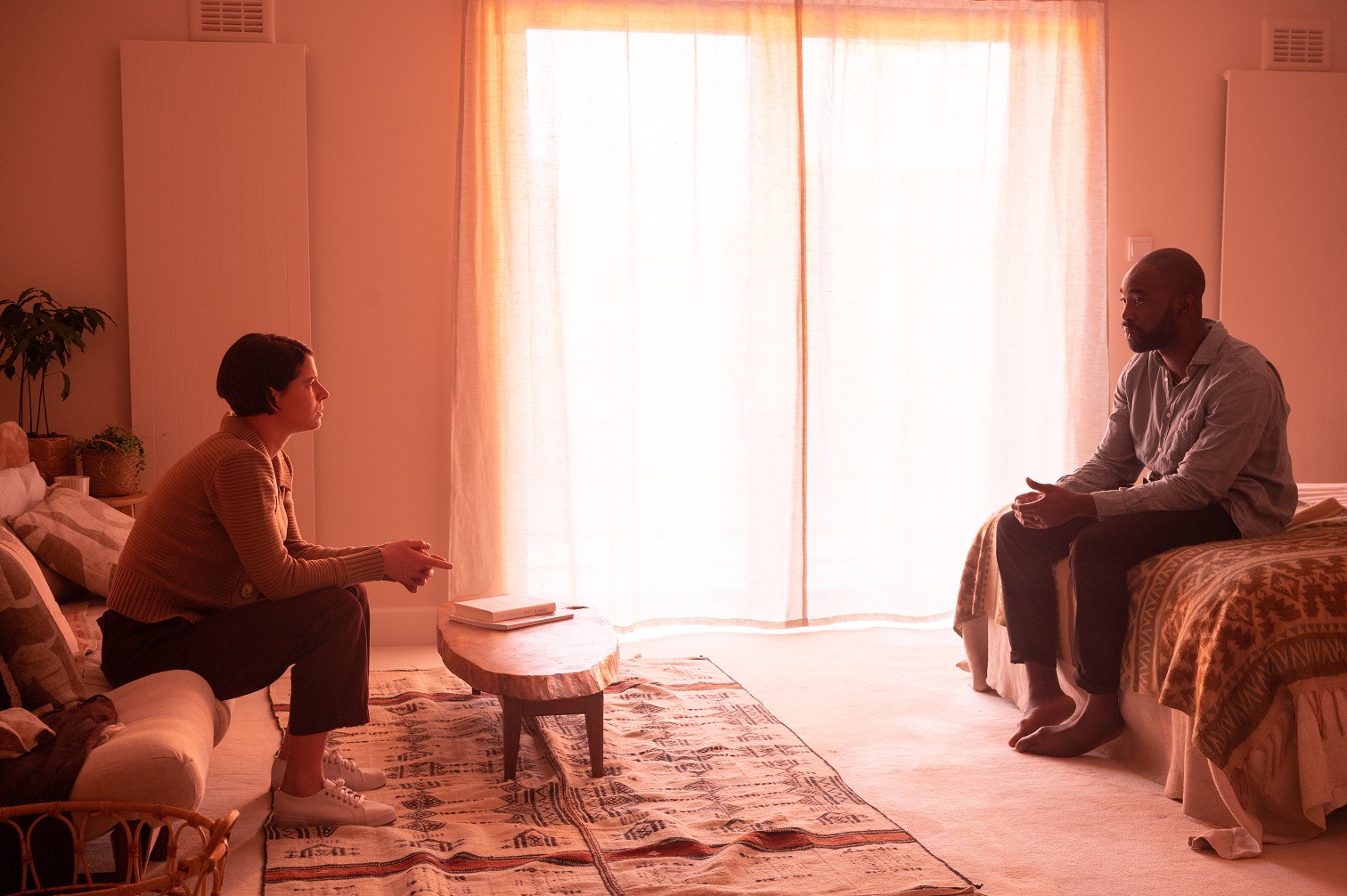Men review - mythic misogyny | reviews, news & interviews
Men review - mythic misogyny
Men review - mythic misogyny
Alex Garland's mournful horror finds masculinity adrift in Old Weird England

This maggoty English pastoral blurs into folk- and body-horror, as Alex Garland dissects a relationship’s mournful aftermath, and sends toxic masculinity into toxic shock.
Harper (Jessie Buckley) rents a grand Cotswold cottage in the grounds of bumbling, benign aristo Geoffrey (Rory Kinnear, pictured bottom with Buckley), seeking to put her marriage’s brutal end behind her. It still haunts her in broken flashback: facing James (Pappa Essiedu, picture below with Buckley) in a sunset-red flat as their marriage viciously unravels. Essiedu’s soulfully demonic James is unable to understand why he can’t possess her love, or comprehend her separateness. So he punches her across the room, before subsequent violence that’s far worse.
Harper bites an apple from a tree as she enters her West Country Eden, in a film mulched in myth. Walking in the woods, she breathes easy and free. Then the rich green becomes hazy, hallucinatory, dandelion seeds blowing like a Sandman’s motes, and at the end of an underpass fit for trolls, a male figure unfolds and pursues her. This scarified, naked male grows into the Green Man (Kinnear), a rustic fertility god also found set in the nearby church’s stone font, flanked by a medieval, vulva-clutching female Sheela-na-gig.
 Garland roots the creeping weirdness in concrete, objective reality, as Harper suffers misogyny from an unctuous vicar, indifferent policeman and spiteful child, with Kinnear as literally everyman. This becomes comic as pub landlord Rory serves PC Rory. But he makes them distinct masculine manifestations, materialising like convincing nightmares, or symbolic cards in a pack.
Garland roots the creeping weirdness in concrete, objective reality, as Harper suffers misogyny from an unctuous vicar, indifferent policeman and spiteful child, with Kinnear as literally everyman. This becomes comic as pub landlord Rory serves PC Rory. But he makes them distinct masculine manifestations, materialising like convincing nightmares, or symbolic cards in a pack.
The final reel sees Garland push into a realm of ritual and metaphor, where a climactic sequence of multiple births becomes a sustained spectacle, David Simpson’s effects recalling Rick Baker and Rob Bottin’s visceral set-pieces in An American Werewolf in London, The Thing and Videodrome, as vaginal slits sprout and dilate, and multiple Rorys scream in pain. These male births show masculinity unmanned, and immersed in female experience.
Images and ideas here linger and cohere after viewing, as Garland pursues an exalted, visionary state too rarely attempted in British cinema. It is, though, fumbled in execution, the true fever dream hovering at the edge of the more grounded, early sylvan scenes not taking hold. Slow-motion is distracting, not dreamy, and only the glistening, protracted gore attains its own gripping logic. We see but don’t feel extraordinary things.
 Jessie Buckley’s nuanced performance is a surer thread, from smiling accommodation with men into a steelier, ritualistic assertion of self. The men, meanwhile, become pitiful, and finally survivable. Geoffrey and James are in their different ways victims of masculine norms, one struggling to be decent, the other doomed.
Jessie Buckley’s nuanced performance is a surer thread, from smiling accommodation with men into a steelier, ritualistic assertion of self. The men, meanwhile, become pitiful, and finally survivable. Geoffrey and James are in their different ways victims of masculine norms, one struggling to be decent, the other doomed.
There are elements of these concerns in Garland’s directorial debut, Ex Machina (2014), where Oscar Isaac’s tech alpha male played god with Alicia Vikander’s artificial, eroticised female. This horror film of timely and strange ideas continues his fascinating course, venturing ever further from his phenomenal, abandoned success as a novelist with The Beach. Garland grew up amongst scientists, and tests film notions to breaking point, finding value even when they fail.
The future of Arts Journalism
You can stop theartsdesk.com closing!
We urgently need financing to survive. Our fundraising drive has thus far raised £49,000 but we need to reach £100,000 or we will be forced to close. Please contribute here: https://gofund.me/c3f6033d
And if you can forward this information to anyone who might assist, we’d be grateful.

Subscribe to theartsdesk.com
Thank you for continuing to read our work on theartsdesk.com. For unlimited access to every article in its entirety, including our archive of more than 15,000 pieces, we're asking for £5 per month or £40 per year. We feel it's a very good deal, and hope you do too.
To take a subscription now simply click here.
And if you're looking for that extra gift for a friend or family member, why not treat them to a theartsdesk.com gift subscription?
more Film
 Die My Love review - good lovin' gone bad
A magnetic Jennifer Lawrence dominates Lynne Ramsay's dark psychological drama
Die My Love review - good lovin' gone bad
A magnetic Jennifer Lawrence dominates Lynne Ramsay's dark psychological drama
 Bugonia review - Yorgos Lanthimos on aliens, bees and conspiracy theories
Emma Stone and Jesse Plemons excel in a marvellously deranged black comedy
Bugonia review - Yorgos Lanthimos on aliens, bees and conspiracy theories
Emma Stone and Jesse Plemons excel in a marvellously deranged black comedy
 theartsdesk Q&A: director Kelly Reichardt on 'The Mastermind' and reliving the 1970s
The independent filmmaker discusses her intimate heist movie
theartsdesk Q&A: director Kelly Reichardt on 'The Mastermind' and reliving the 1970s
The independent filmmaker discusses her intimate heist movie
 Blu-ray: Wendy and Lucy
Down-and-out in rural Oregon: Kelly Reichardt's third feature packs a huge punch
Blu-ray: Wendy and Lucy
Down-and-out in rural Oregon: Kelly Reichardt's third feature packs a huge punch
 The Mastermind review - another slim but nourishing slice of Americana from Kelly Reichardt
Josh O'Connor is perfect casting as a cocky middle-class American adrift in the 1970s
The Mastermind review - another slim but nourishing slice of Americana from Kelly Reichardt
Josh O'Connor is perfect casting as a cocky middle-class American adrift in the 1970s
 Springsteen: Deliver Me From Nowhere review - the story of the Boss who isn't boss of his own head
A brooding trip on the Bruce Springsteen highway of hard knocks
Springsteen: Deliver Me From Nowhere review - the story of the Boss who isn't boss of his own head
A brooding trip on the Bruce Springsteen highway of hard knocks
 The Perfect Neighbor, Netflix review - Florida found-footage documentary is a harrowing watch
Sundance winner chronicles a death that should have been prevented
The Perfect Neighbor, Netflix review - Florida found-footage documentary is a harrowing watch
Sundance winner chronicles a death that should have been prevented
 Blu-ray: Le Quai des Brumes
Love twinkles in the gloom of Marcel Carné’s fogbound French poetic realist classic
Blu-ray: Le Quai des Brumes
Love twinkles in the gloom of Marcel Carné’s fogbound French poetic realist classic
 Frankenstein review - the Prometheus of the charnel house
Guillermo del Toro is fitfully inspired, but often lost in long-held ambitions
Frankenstein review - the Prometheus of the charnel house
Guillermo del Toro is fitfully inspired, but often lost in long-held ambitions
 London Film Festival 2025 - a Korean masterclass in black comedy and a Camus classic effectively realised
New films from Park Chan-wook, Gianfranco Rosi, François Ozon, Ildikó Enyedi and more
London Film Festival 2025 - a Korean masterclass in black comedy and a Camus classic effectively realised
New films from Park Chan-wook, Gianfranco Rosi, François Ozon, Ildikó Enyedi and more
 After the Hunt review - muddled #MeToo provocation
Julia Roberts excels despite misfiring drama
After the Hunt review - muddled #MeToo provocation
Julia Roberts excels despite misfiring drama
 London Film Festival 2025 - Bradley Cooper channels John Bishop, the Boss goes to Nebraska, and a French pandemic
... not to mention Kristen Stewart's directing debut and a punchy prison drama
London Film Festival 2025 - Bradley Cooper channels John Bishop, the Boss goes to Nebraska, and a French pandemic
... not to mention Kristen Stewart's directing debut and a punchy prison drama

Add comment